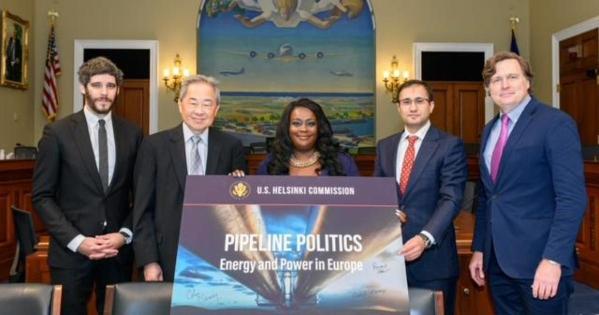Alumna and Advisor at World Bank Talks Mentorship and Barriers to Careers in International Service

While most American University students are driven in their careers, alumna Danica Starks, SIS/BA ’99, started her international studies just a bit sooner than most – at just 13 years old, she had her first informational interview with a diplomat.
Now the Senior US Commercial Liaison and Advisor to the US Executive Director at the World Bank and Head of the Commerce Department’s Multilateral Development Bank Group, Danica has more than 20 years of experience in international economic policy, commercial diplomacy, trade, and national security.
Danica grew up as what she called a “child of the DMV,” making DC and its surrounding areas her home. Her location proved advantageous when her father, a musician in their family’s church, directed a musical group at the State Department and found Danica’s earliest connections.
Living near DC let her participate in multiple youth programs, including exchange programs. During high school, she spent months in both Norway and Spain as a part of her International Baccalaureate program.
When it came time to choose a college, Danica said that her decision was relatively easy. Her mother attended AU starting in 1968 for psychiatric nursing, a particularly tumultuous time for women of color in education. She recommended the school for its international studies program.
“I spent most of high school 50 percent thinking I was going to go to AU,” Danica said. “So, we visited over Thanksgiving break, and it was like the Disney animated movie Pocahontas where she sings ‘Colors of the Wind’ with the leaves all rustling around. It was like it was inevitable. That’s where I was supposed to be.”
During her time in college, Danica said she “squeezed all she could out of AU.” She managed two majors – in international studies and economics – and a minor in Russian and Eastern European studies as well as two semesters abroad—all in just four years. She said it took her weeks to work out a class schedule using the course catalog, but she planned her entire college career prior to her freshman year.
Danica joined the Slavic Honor Society and the Russian Club at AU before her semesters abroad in Moscow and Prague. She also pledged the Alpha Kappa Alpha sorority, which helped introduce her to the kinds of mentorship she emulates today.
Through her sorority, Danica was able to work on and later take over a mentoring program for high school and middle school girls, teaching subjects like etiquette and career preparation.
“It was really kind of a calling,” Danica said. “It’s a way to give back and help people overcome, to inspire the next generation. It’s a great way to make sure people don’t go through the same things I did early in my career, especially for women and women of color.”
She later participated in the School of International Service’s formal mentoring program, and soon found herself with dozens of student mentees. Overwhelmed but aiming to continue mentoring, she created Monthly Mentoring Mondays, a program that invites students for discussions of career and leadership with experts in the international studies fields.
“As I got older, I saw that there weren’t enough people coming behind me that looked like me,” Danica said, “and it became a real concern that I wasn’t doing enough to make sure the pipeline was there, and that people had access. That’s why I started my own program.”
Danica helps run other mentorship and volunteer programs, including the ITA Ambassadors Program, a diversity recruitment initiative, and Engaging Minorities in International Cultures (EMIC), an organization that helps children embrace learning about foreign cultures and to learn foreign languages. She is also the Prince George’s County Lead for Moms Demand Action for Gun Sense in America, a group that fights for gun safety protocols and an end to gun violence.
Outside of her mentorship and volunteer work, Danica’s career has also had a focus on promoting social good – but she says that she didn’t climb the ladder straight up. “Sometimes you go sideways,” she says. “Sometimes you get pushed down three rungs…As a black woman, you’re fighting the image of the white male as what a diplomat looks like and what an international expert should be.”
She credits this mainstream image to a lack of role models and mentors who reflect the diversity of the field, but she was able to make herself by finding a niche in her work – her focus turned from Russia to other Eastern European countries formerly tied to the Soviet Union. With this focus on countries like Ukraine, Kazakhstan, and Armenia, she found kinship.
“They were countries that weren’t as prominent, but I found people who had been considered minorities themselves in the Soviet Union,” she said. “They were getting no attention or respect, and they were fighting the same battles I was fighting.”
For roughly 10 years, she worked directly with governments in that region, doing work that “felt like she was making a difference.” She also spent almost two decades working to expand economic relations and develop market economies in Eastern Europe.
“And so, it took a lot of hard work, a lot of blood, sweat, and tears,” she said. “I had to do a lot of innovation, and I had to create a lot of paths for myself, thinking, ‘okay, nobody wants to give me a seat at the table over here. So, I'm going to have to create my own initiative over there,’ and then make my initiative so good and so effective that it gets mainstream.”